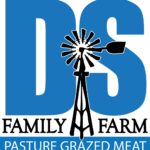Worried about what you are "really" eating? Have peace of mind with pasture grazed meats.
Mobile Pork
You are probably aware that we call our mobile floorless chicken protectors “Chicken Tractors”. Now that we have pigs on the move, below is the design of our first “Pig Tractor.”
Basic Setup
The initial idea behind using a pig tractor came from Greener Pastures Ranching (Steve Kenyon). From there we searched YouTube and liked one that showed using upside-down cattle tube panels that have curved ends to skid along the ground. In our version shown above, we used three steel 16-foot tube hog gates. The two “side” gates are flipped over as skids. The front upright steel gate rides on the two skid gates and is also supported by caster wheels. The back is a simple farm store hog panel.
These steel hog tube gates are heavy compared to typical cattle tube gates. The extra weight is a possible drawback, but the short height makes it easy for Doug to step over. What keeps the frame somewhat square as you skid around a corner? It is difficult to see in the photo above, but there are cross wires (12.5 gauge smooth wire) that make an “X” from one side panel to the other. Between skidding along the ground and the cross wires pulling on the side panels, the tractor stays in a fairly uniform square shape as you make a turn. Additional wires keep the flimsy back hog panel from bowing out.
Details
The above photos show how the Pipe Gate Hinges fit between the front upright (pull gate) and the two upside-down skid gates.
- The hinge attached to the side skid gate is below and supports the front upright gate.
- We have filled the upside-down gate pipe with foam sealant to prevent rainwater from running down into the skid gate tube.
- The heavy-duty nylon pull strap is wrapped around and slid up a connector pin in the right photo.
- The strap can be easily removed to create a temporary opening for the pigs to leave the tractor (see photo below).
Water
Providing water to our animals is always a concern. Since water weighs 8 lbs. to the gallon, getting water to different locations quickly and easily is always a challenge. We all know, there is nothing more inviting to a pig than water and soil to create a mud hole!

In this example, they slobbered enough water from the drinking nipple to create a mud hole.
To prevent mud holes in our Pig Tractor, we added a piece of steel mesh that acts as a skid for our water tank. This prevents the pigs from dripping water from the drinking nipple and digging a mud hole. Before we move the tractor, we quickly drain any remaining water in the tank to remove the extra weight.
The Move
As mentioned earlier, the front upright gate is supported by three caster wheels in addition to resting on the top of the gate hinges of the skid panels. Below right photo shows the caster wheel details. These may not be needed but provides extra support to the front panel.
As for the pull straps:
- Two independent straps are attached.
- The smaller strap is attached in the middle of the panel and used for short quick turns.
- The smaller strap has a permanent knot that prevents sliding along the longer strap.
- The longer strap provides additional end panel pull support for long straight runs.
Shade
Pigs love trees and shade. As shown above, we can open the tractor to allow pigs to access temporary electric net areas that run under trees for the pigs to root around. But the tractor also has a tarp for shade and also protects from the rain.

A tarp is important for providing shade and protection from the rain.
Portable Home Base
We attempted to keep it as simple as possible with few moving parts. The pig’s supplemental grains (no corn/no soy) are only fed in the pig tractor. Grazing in electric net areas outside the tractor will be as often as feasible. If a pig happens to escape, we are pretty sure they will want to return to home base to get their grains! This initial group of pigs and Nebraska elements will give this first version of our pig tractor a good test. Looking forward to figuring out how to make it better.
If you have suggestions or comments, please add them to our Facebook page under this post.









